‘An economic stimulus boon’: Local tech companies seek CHIPS Act money

By
As the federal government begins handing out massive subsidies to boost the US semiconductor industry, Massachusetts tech companies are well-placed to cash in.
The CHIPS and Science Act signed last week by President Biden provides billions in subsidies and tax breaks to preserve US leadership in semiconductor manufacturing and research. A lot of that money could end up in Massachusetts, a major producer of microchips and the gear needed to make them.
The CHIPS Act includes $39 billion in subsidies for construction of new chip factories, called “fabs,” as well as a 25 percent tax credit for purchases of chipmaking equipment. There’s also $11 billion to help pay for research in advanced manufacturing techniques and for workforce training. And there’s an $82 billion boost to federal spending on scientific research and development.
“This is going to be an economic stimulus boon for our region,” said James Brett, president of the New England Council, a regional business association that lobbied for passage of the act.
It’s unlikely that Massachusetts will attract a massive new chip factory. Many of the world’s top chipmakers have already committed to other US locations, including Texas, Arizona, and Ohio, where semiconductor giant Intel will soon begin building two new fabs at a cost of $20 billion.
But some of the cash will be available for upgrades of existing fabs. That’s good news for Analog Devices, the state’s top chipmaker. With fiscal 2021 revenue of $7.3 billion, Analog Devices operates manufacturing facilities in Wilmington and Chelmsford, and several other locations worldwide. The company doesn’t make the kind of high-end computing and graphics chips offered by giants like Intel, AMD, and Nvidia. Instead, it produces less glamorous but essential products that process analog data in cars, computers, and countless other devices.
Rebecca Diaz, vice president of government affairs at Analog Devices, said in an e-mail that her company hopes to tap the new federal subsidies and tax benefits to grow its manufacturing capacity. Diaz also noted that the CHIPS Act includes funding for the development of a new National Semiconductor Technology Center, to conduct research in advanced chip design. She said Analog Devices is eager to participate.
“This will ensure continued U.S. leadership in the next generation of semiconductor technologies,” Diaz said.
Another close observer is Woburn-based Nantero, a Harvard University spinoff that makes memory chips incorporating extremely small carbon tubes. According to chief executive Rob Snowberger, Nantero chips use far less power than traditional memory chips. But while the company has made small quantities of the chips for military and aerospace clients, Snowberger said the company’s venture investors couldn’t come up with the hundreds of millions needed to build a full-scale fab for mass production.
“In the semiconductor business, a VC level of funding isn’t enough to get you where you need to go,” said Snowberger. He’d been considering moving Nantero to Japan, but with the passage of the CHIPS Act, he’s now hoping to score some federal funds to build a factory here.
“Boston is our home, and we don’t want to leave,” Snowberger said.
Many of the state’s likely beneficiaries don’t make chips; instead, they build the intricate and costly machines used by the chipmakers. For instance, Onto Innovation in Wilmington makes multimillion-dollar systems that measure the nanometer-sized features on silicon wafers, to make sure they’re being correctly manufactured. And MKS Instruments in Andover makes an array of products used in chemically treating the silicon wafers, as well as optical systems for etching the circuits onto the chips.
As chipmakers use their subsidies to build new fabs or expand their existing facilities, companies like Onto and MKS expect a gush of new orders. “We’re going to benefit mostly from those customers of ours buying more stuff,” said MKS chief executive John Lee.
MKS and Onto are also teaming up with MIT Lincoln Lab and UMass Lowell to propose construction of an advanced research center in Massachusetts focused on semiconductor packaging. Increasingly, microprocessors are made up of “chiplets”— specialized slivers of silicon bonded together in a single integrated package.
But assembling evermore sophisticated chiplets into a single package will require a major investment in research. The CHIPS Act has set aside $2.5 billion for advanced packaging research. Ben Brown, Onto’s assistant general counsel, said the MKS-Onto consortium is hoping to see the lab built in Massachusetts.
“It would help the general US ecosystem to do more advanced stuff than currently exists in the US,” he said.